|
|
|
Sort Order |
|
|
|
Items / Page
|
|
|
|
|
|
|
| Srl | Item |
| 1 |
ID:
083038
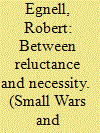

|
|
|
|
|
| Publication |
2008.
|
| Summary/Abstract |
The civil-military interface in peace support operations is changing due to increasingly overlapping tasks, increased military involvement in humanitarian activities, and increased integration of all involved actors, not least through various current strategic concepts. This article not only describes these trends, but also, more importantly, analyses certain consequences in terms of mission effectiveness. The focus of the analysis is the ideas of 'militarisation of humanitarian aid' and the reverse 'humanitarianisation of the military'. The main arguments of this contribution are that the assumptions of increased effectiveness stemming from civil-military integration cannot be taken for granted and that there are harmful consequences stemming from blurring the lines between civilian, humanitarian and military actors. There is, in other words, a need to better specify and explain the causal mechanisms that lead to effectiveness in complex peace support operations.
|
|
|
|
|
|
|
|
|
|
|
|
|
|
|
|
| 2 |
ID:
120307
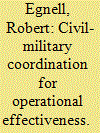

|
|
|
|
|
| Publication |
2013.
|
| Summary/Abstract |
The last decade has witnessed a cascading proliferation of strategic concepts that emphasise the importance of civil-military cooperation, coordination, or integration for effectiveness in complex operations. These efforts nevertheless often lack an appreciation for why, where, and how such integration and coordination should take place to achieve the desired outcomes. This article introduces a new approach to civil-military coordination that incorporates the challenges and possibilities at both the national/strategic level and the tactical level in field of operations. By integrating and coordinating these efforts at the strategic level, this approach allows policymakers to achieve separation of actors and responsibilities in the field of operations. By doing so, the proposed approach seeks to answer more specific questions about when coordination is necessary for effectiveness, what its aims are, what actors need to be involved, and to what extent and at what level of command the actors need to be coordinated.
|
|
|
|
|
|
|
|
|
|
|
|
|
|
|
|
| 3 |
ID:
094611
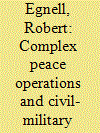

|
|
|
|
|
| Publication |
Oxon, Routledge, 2009.
|
| Description |
xii, 219p.
|
| Standard Number |
9780415490238
|
|
|
|
|
|
|
|
|
|
|
|
Copies: C:1/I:0,R:0,Q:0
Circulation
| Accession# | Call# | Current Location | Status | Policy | Location |
| 054863 | 355.49/EGN 054863 | Main | On Shelf | General | |
|
|
|
|
| 4 |
ID:
075734
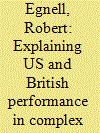

|
|
|
|
|
| Publication |
2006.
|
| Summary/Abstract |
A nation's structure and culture of civil-military relations are important and largely overlooked factors in explaining the performance of armed forces involved in complex expeditionary operations. The US model of 'Huntingtonian', divided civil-military structures and poor interagency cooperation, makes the US military less suited for complex expeditionary operations. British civil-military relations involve a Defence Ministry that conscientiously integrates military and civilian personnel, as well as extensive interagency cooperation and coordination. This 'Janowitzean', integrated form of civil-military relations makes the British military more likely to provide for the planning and implementation of comprehensive campaigns that employ and coordinate all instruments of power available to the state, as well as troops in the field displaying the flexibility and cultural and political understanding that are necessary in complex expeditionary operations.
|
|
|
|
|
|
|
|
|
|
|
|
|
|
|
|
| 5 |
ID:
124233
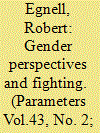

|
|
|
|
|
| Publication |
2013.
|
| Summary/Abstract |
Many concerns related to women in combat roles stem from two related assumption: (a) the existing structure and culture of the armed forces are well adapted to the requirements of combat; and (b) politically imposed change is harmful to the professionalism and effectiveness of the military. These can be dangerous assumptions. Instead, the traditional "truths" about the nature of unit cohesion and the optimal capabilities of individual soldiers and officers need to be periodically examined. Doing so can maximize the effectiveness of military organizations in a changing environment.
|
|
|
|
|
|
|
|
|
|
|
|
|
|
|
|
| 6 |
ID:
103294
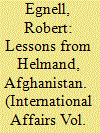

|
|
|
|
|
| Publication |
2011.
|
| Summary/Abstract |
This article analyses the conduct of British operations in Helmand between 2006 and 2010 and discusses the implications for the legacy and future of British counterinsurgency. A number of lessons stand out: first, competence in the field of counterinsurgency is neither natural nor innate through regimental tradition or historical experience. The slow adaptation in Helmand-despite the opportunity to allow the Basra experience to be a leading example of the need for serious changes in training and mindset-is an indication that the expertise British forces developed in past operations is but a distant folktale within the British Armed Forces. Substantially changed training, painful relearning of counterinsurgency principles and changed mindsets are therefore necessary to avoid repeated early failures in the future. Moreover, despite eventually adapting tactically to the situation and task in Helmand, the British Armed Forces proved inadequate in dealing with the task assigned to them for two key reasons. First, the resources of the British military are simply too small for dealing with large-scale complex engagements such as those in Helmand or southern Iraq. Second, the over-arching comprehensive approach, and especially the civilian lines of operations that underpinned Britain's historical successes with counterinsurgency, are today missing.
|
|
|
|
|
|
|
|
|
|
|
|
|
|
|
|
| 7 |
ID:
099853
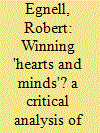

|
|
|
|
|
| Publication |
2010.
|
| Summary/Abstract |
This article conducts a critical analysis of the historical lessons, the assumptions and the conduct of 'hearts and minds' approaches to counter-insurgency. This results in challenges. Theoretically the 'hearts and minds' approach is rooted in modernisation theory and a normative Western approach to legitimacy that fails to live up to the expectations of the local population. The approach is also based on lessons from past successes such as the British 1950s campaign in Malaya. However, a great contextual shift has taken place since then and the relevance of past experiences is therefore questionable in a context of complex state-building in the wake of intervention. This also has practical consequences as we seek to rectify the often misapplied approaches of today.
|
|
|
|
|
|
|
|
|
|
|
|
|
|
|
|
|
|
|
|
|